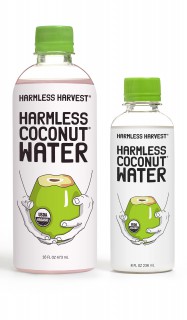Harmless Harvest has removed the phrase “100% Raw” from labels of its original coconut water varieties and renamed the products as “Harmless Coconut Water.” The company announced the update in a July 31 blog post, and yesterday published news of the new labels on its social media accounts.
Harmless Harvest has long held the position that its use of high pressure processing (HPP), which, unlike heat-based pasteurization, uses pressure to inhibit bacteria growth, allows for the use of the term, particularly with regard to the ability of the processing method to maintain the flavor and the nutritional content of the coconut water.
However, citing the growth of the use of the term “raw” on a number of new products, and the U.S. Department of Agriculture’s “lack of legal definition or certification for the term,” Harmless Harvest wrote in its blog post that “there is no way for us—or any product—to achieve official certification that we are a raw product,” hence the decision to remove “100% Raw” from its labels.
“With the never-ending confusion in descriptions and claims on beverage shelves, we thought the time was ripe to clarify what we make and how,” the company wrote.
Harmless Harvest noted that “the last thing we want to do is create more confusion and copycats dilute such a powerful word and go the way of other meaningful words such as ‘natural.’” Following that phrase, however, came the declaration, “Yes, we are raw.”
Harmless Harvest’s move may prove to be influential because of its pioneering use of HPP. Meanwhile, regulatory agencies are also exploring that processing method and its associated terminology.
Over the past year, coconut water beverages labeled and sold as “raw” have attracted the watchful eye of the U.S. Food and Drug Administration (FDA), which states that the use of HPP alone is not enough to achieve a “five-log reduction,” a regulatory requirement of a 100,000 fold decrease in the number of microorganisms for juice that is packaged and sold. The FDA requires a secondary step, such as acidification or the use of ultraviolet light or radiation, is needed to control bacteria growth.
At the time, Harmless Harvest co-founder Justin Guilbert told BevNET that to its knowledge, the company’s “proprietary processes and approach differ substantially from any other comparable product.”
The company is “always in proactive discussions with many experts in food safety as well as the FDA to abide by their guidelines and recommendations,” Guilbert added. Harmless Harvest maintains that the product is not irradiated or treated with UV light.
In its post, the company stated that the coconut water is “essentially unchanged.” It added that the coconut water will continue to be sourced from “organic Thai Nam Hom coconuts that have been sustainably farmed and hand-picked” and “it will still be a non heat-pasteurized product.”
On its website, Harmless Harvest has already updated most of the imagery of its original coconut water labels to reflect the updated name (the company’s familiar logo of a two hands holding a young coconut remains the same). Harmless Harvest has yet to reveal new labels for its flavored varieties; photos of the products on its website continue to use “100% Raw” labels.
As for the phrase “Harmless Coconut,” it appears that Harmless Harvest may have some innovation in the pipeline that goes beyond coconut water. On March 26, the company filed an application with the U.S. Patent Office to trademark the phrase, describing its use for a “Coconut-based beverage used as a milk substitute; Prepared coconut.”
BevNET is continuing to follow this story and is expected to speak with Harmless Harvest founders this week.
